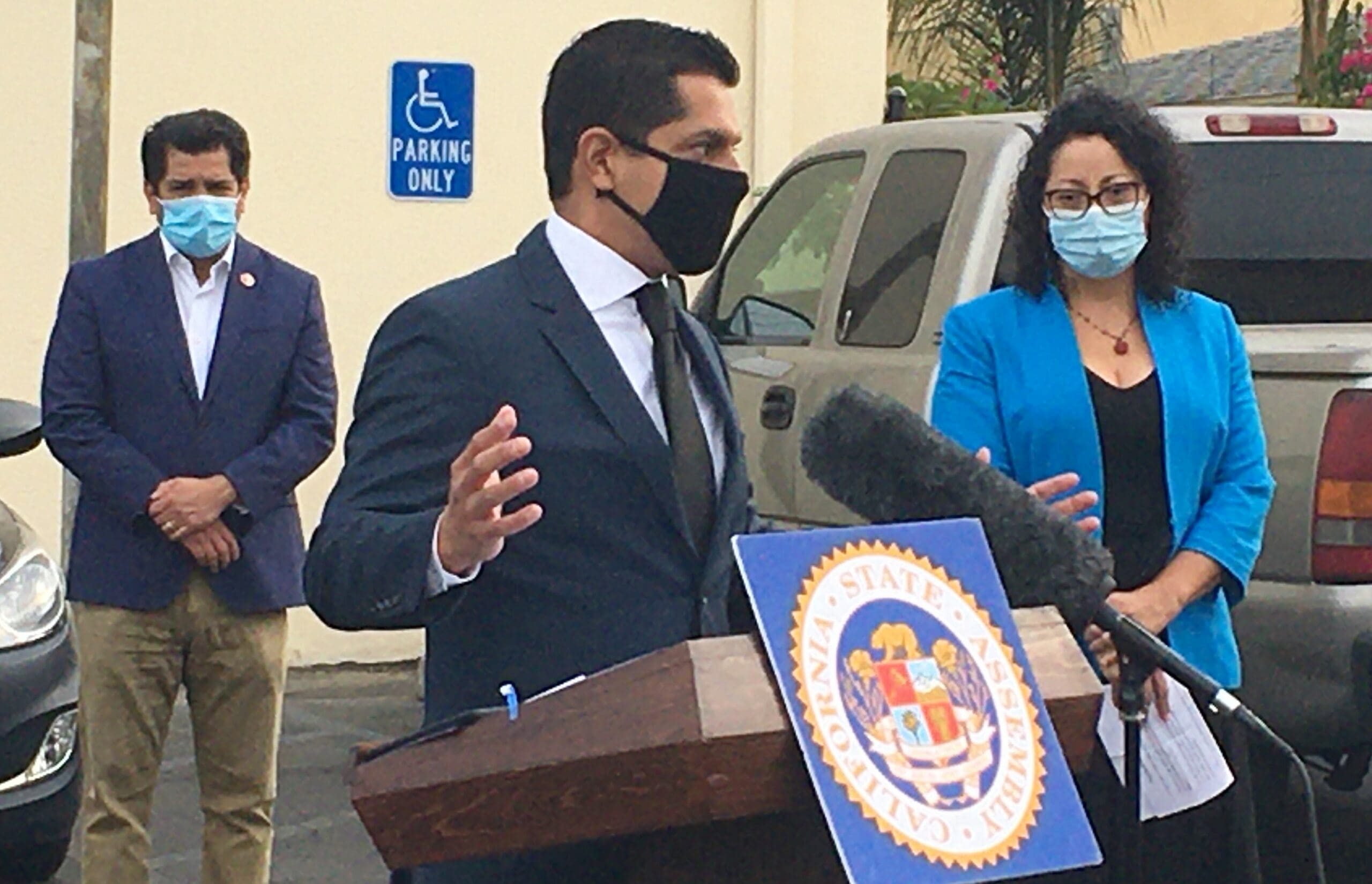Latest News
Elected Officials Blast Proposed Exide Deal With Justice Dept.
Co-published by L.A. Taco
In the wake of Exide’s bankruptcy filing, questions arise about the state’s missed opportunities to secure recovery costs from Exide.

Legislators, officials and community leaders gathered Tuesday morning at the Resurrection Church in Boyle Heights, on the Eastside of Los Angeles, to decry Exide Technologies’ proposed bankruptcy settlement agreement. The speakers claim the deal will allow the company to walk away from potentially hundreds of millions of dollars in cleanup costs from lead and other toxic contamination incurred at its former lead battery recycling facility in Vernon and in the surrounding community.
Co-published by L.A. Taco
“The worst of corporate polluters, they’re just trying to walk away with whatever they can,” said Assemblymember Miguel Santiago of Exide and the proposed agreement, which enjoys approval from the Department of Justice (DOJ).
Environmentalists see the proposed agreement as another instance of the Trump administration siding with industry.
The eight-day public comment period on the agreement ended today, and a federal bankruptcy court hearing is scheduled for next week. Santiago is one of seven legislators to sign a letter asking U.S. Attorney General William Barr to extend the agreement’s comment period for 60 days, and for a public hearing. “We implore the Department of Justice to oppose Exide’s proposed abandonment of the Vernon facility,” states the letter — one of several such missives vested parties have submitted to both the Justice Department and California attorney general’s office.
“All we ask is that we have some justice here and we hold people accountable,” said Assemblymember Cristina Garcia, another letter signatory, at Tuesday’s press conference.
Indeed, members of environmental groups tell Capital & Main that the proposed agreement is another instance of the Trump administration reflexively siding with industry. A hearing extension, however, could push a decision on the proposed agreement until after the general election – and into the hands of a far different DOJ. “It does make a difference who’s in the White House,” said U.S. Representative Jimmy Gomez. “It does make a difference who the attorney general is.”
Today’s news conference signals the latest attempt by the state to recover cleanup costs from Exide. Last May, Exide filed for Chapter 11 bankruptcy for the third time in 20 years. Then, in September, the DOJ executed the proposed consent decree and settlement agreement with Exide, which officials say affords the company permission to abandon various cleanup commitments at its former plant, including a court-ordered study to determine the full extent of the pollution it created.
This proposed agreement runs counter to an Obama-era nonprosecution agreement the U.S. Attorney’s Office negotiated with Exide in 2015, which provided that the company would avoid federal prosecution if it abided by certain obligations as a responsible party for the contamination. Officials estimate it could cost as much as $100 million to remediate the site, of which only a “small portion” is covered by money Exide has already provided, according to the letter to Barr.
Similarly, the task to clean the neighborhoods around the former plant itself is only partially complete. For decades the Vernon site spewed a toxic cocktail of lead, arsenic and other contaminants into communities that are among the most environmentally burdened in the state. As part of the largest such cleanup in the state’s history—one overseen by the Department of Toxic Substances Control (DTSC)—the ongoing project to remediate thousands of homes around the plant has been beset with confusion, shifting deadlines and massive budget overruns, with California taxpayers already fronting north of $250 million.
Critics question whether regulators and state officials have missed vital opportunities to secure recovery costs from Exide. “The state could have done, and needs to do, so much more,” warned Jane Williams, executive director of California Communities Against Toxics and a member of the DTSC-supported Exide Advisory Group, after the press conference wrapped.
Copyright 2020 Capital & Main

-

 Latest NewsFebruary 3, 2026
Latest NewsFebruary 3, 2026Amid the Violent Minnesota Raids, ICE Arrests Over 100 Refugees, Ships Many to Texas
-

 Featured VideoFebruary 4, 2026
Featured VideoFebruary 4, 2026Protesters Turn to Economic Disruption to Fight ICE
-

 The SlickFebruary 2, 2026
The SlickFebruary 2, 2026Colorado May Ask Big Oil to Leave Millions of Dollars in the Ground
-

 Column - State of InequalityFebruary 5, 2026
Column - State of InequalityFebruary 5, 2026Lawsuits Push Back on Trump’s Attack on Child Care
-

 Column - California UncoveredFebruary 6, 2026
Column - California UncoveredFebruary 6, 2026What It’s Like On the Front Line as Health Care Cuts Start to Hit
-

 The SlickFebruary 10, 2026
The SlickFebruary 10, 2026New Mexico Again Debates Greenhouse Gas Reductions as Snow Melts
-

 Latest NewsFebruary 12, 2026
Latest NewsFebruary 12, 2026Trump Administration ‘Wanted to Use Us as a Trophy,’ Says School Board Member Arrested Over Church Protest
-

 Latest NewsFebruary 10, 2026
Latest NewsFebruary 10, 2026Louisiana Bets Big on ‘Blue Ammonia.’ Communities Along Cancer Alley Brace for the Cost.

